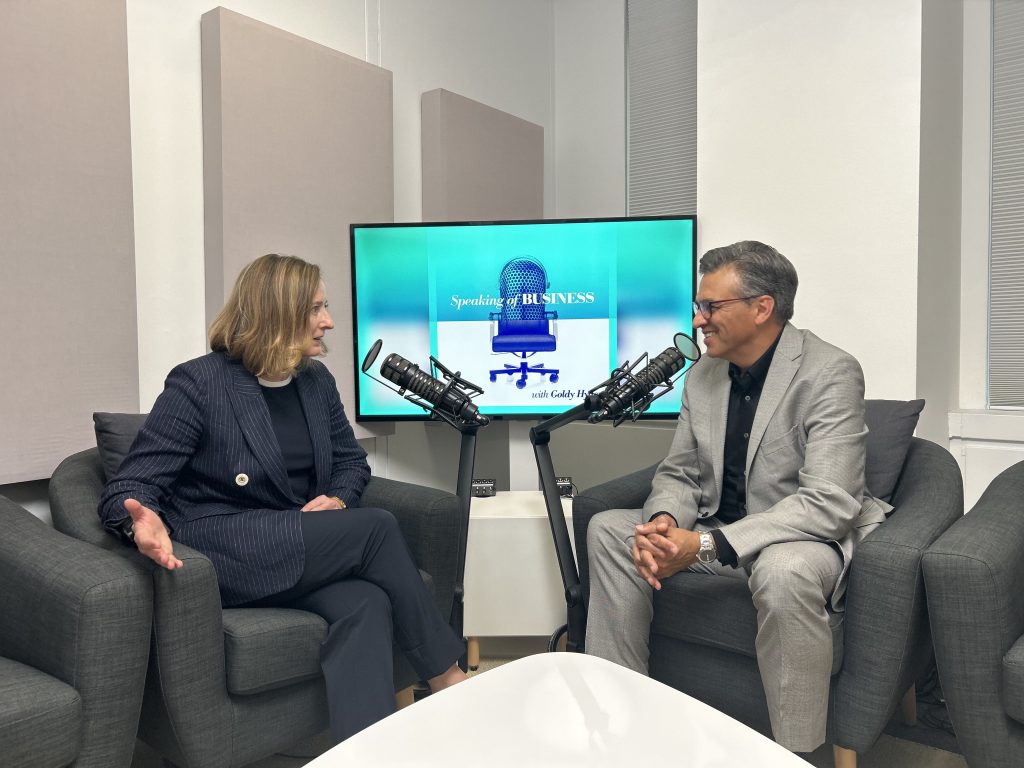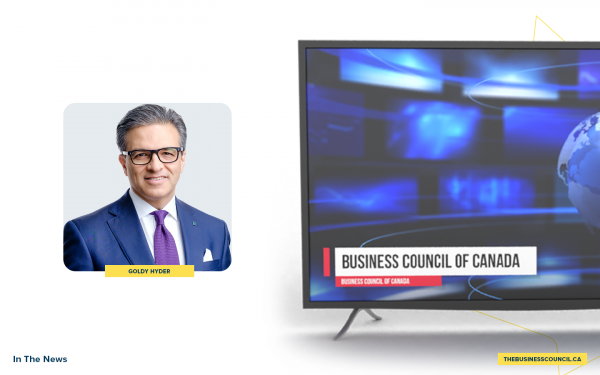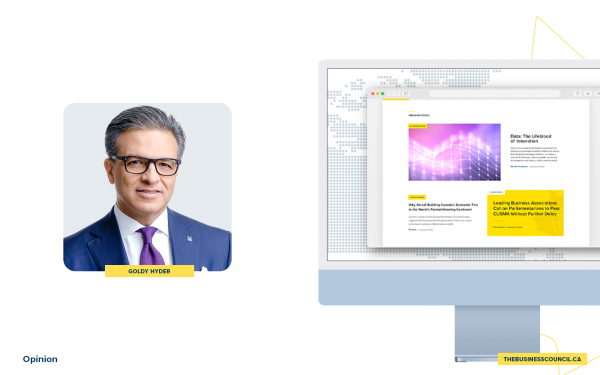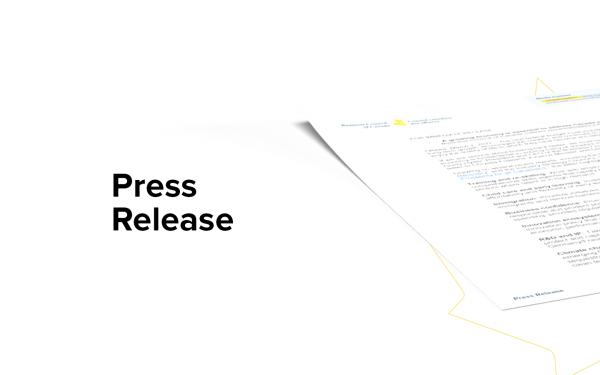Carolyn Wilkins on productivity and economic growth
Carolyn Wilkins is fully aware how “geeky” it is to talk about economic growth.
But the former senior deputy governor of the Bank of Canada has made a career out of it, and she is inviting everyone else to get in on the conversation – because it’s the very lifeblood of our quality of life.
“The economy is the foundation of peoples’ financial and social well-being,” she says. “The kind of jobs people have, how much money they have at the end of the week, whether they can afford a vacation, that all depends on the state of the economy.”
In a conversation with Goldy Hyder on the Speaking of Business podcast, Wilkins takes the pulse of Canada’s economy and discusses the impact it’s having on Canadians’ standard of living.

She brings a unique perspective that reflects both her Canadian professional history and her current work beyond Canada’s borders. She draws on her experience as an external member of the Bank of England’s Financial Policy Committee and senior research scholar at Princeton University’s Griswold Center for Economic Policy.
She says she sees countries around the world working hard to rebuild their economies to be more competitive in a post-COVID world. “When I look at Canada from the outside, I can see the competition better, and it worries me because I think we need to up our game.”
How? She has lots of ideas.
Listen to the full podcast to hear Carolyn Wilkins’ solutions to strengthen Canada’s economy.
Subscribe
You can find Speaking of Business wherever you get your podcasts.
Latest Podcasts
Transcript
Carolyn Wilkins
People love Canada, they admire it just like I do, but the thing they will say about us maybe a little in jest, is that we’re really nice. It’s nice to be nice, but it’s even better to be ambitious and to be a place where things are happening
Goldy Hyder
Welcome to Speaking of Business, conversations with Canadian innovators, entrepreneurs and business leaders.
I’m Goldy Hyder, President and CEO of the Business Council of Canada. I don’t know about you, but I find the summer is a good time for taking stock. After the busyness of the first few months of the year, the summer is often a chance to catch your breath, take a step back and look at the big picture. When it comes to Canada’s economy, the big picture can be a little blurry. Why are things still so expensive? How does Canada compare to other countries, and what can we do to boost productivity? Luckily, my guest today is someone who has spent her career making sense of the big picture.
Carolyn Wilkins wears many hats. She is a visiting research scholar with Princeton’s Griswold Center for Economic Policy Studies, an external member of the Bank of England’s Financial Policy Committee, a member of the board at Intact Financial Corporation, and is former Senior Deputy Governor of the Bank of Canada. Carolyn and I are also both members of the Advisory Council of the Coalition for a Better Future. I can’t tell you how thrilled I am that she’s able to spend some time with us today and that too, in person.
Welcome to the podcast, Carolyn.
Carolyn Wilkins
Thank you very much, Goldy, it’s just great to be here. I’m a big fan of your podcast.
Goldy Hyder
Well, thank you. We appreciate it and it’s a growing audience and it’s because of guests like you who bring such an interesting perspective for Canadians, not just about Canada, but our place in the world. And boy, there’s a lot going on out there, and I thought that’s kind of where we would start. A lot is being said about economic growth in our country and outside of our country. Sometimes that phrase comes across as business-y. Why should the average person, the average Canadian just working hard to make ends meet, raise their family, plan a vacation, save some money, why should they care about economic growth?
Carolyn Wilkins
Well, it does seem like a really geeky concept, something that economists and business people would talk about. But in fact, the economy is the foundation of peoples’ financial and economic social well-being. The kind of job people have, how much money they have at the end of the week to go to the grocery store, whether they can afford a vacation, that all depends on the state of the economy. And economic growth is just a way to increase people’s living standards so that parents that I had wished that I would do better when I grew up than they did, and part of the reason that these kinds of dreams are possible are because of economic growth.
Goldy Hyder
You mentioned living standards and we talk a lot about quality of life and standard of living, again, seems very geeky concepts to the average person. Connect the dots for us here. How is it that when you have an economy that’s growing, that we are able to help address the standard of living, quality of life? And I ask that in the backdrop of, we’re the first generation to actually not make life better for the next generation.
Carolyn Wilkins
That’s top of mind for so many people, especially people who have younger individuals in their family. I have a son, you have children, and I know many people have nieces and nephews as well, and it is a worry for them and for us as well.
From my point of view, what economic growth does is it allows you to afford things like education, things that we aspire to, like a cleaner environment, or actually making good on our promise to NATO to …
Goldy Hyder
Or our promise for healthcare.
Carolyn Wilkins
Or our promise for healthcare. And the reality is, is that the things that we aspire to on the social level that really improve our quality of living, whether we have broadband so we can start a small business in rural Canada, or whether or not we can afford to train doctors and then have hospitals that have the kind of equipment like MRI machines that we need to give people good healthcare, whether we can take care of our aging population, our parents who are getting older. All these things take financial resources.
Goldy Hyder
Yeah. Do you believe fundamentally Canadians get that?
Carolyn Wilkins
Well, I think they do at an individual level because they face it every day.
Goldy Hyder
They’re running their own economy, aren’t they?
Carolyn Wilkins
They’re running their own economy and I think economics is really local. The corner store that you love to go to pop in and buy some milk is still there in a year, really depends on how well the economy’s doing, the kind of workers they can attract, whether or not they have enough sales to make payroll, to buy new products for their inventory. Individuals, every time they go to the grocery store, they think about are their wages going to make ends meet. Can they buy the kinds of foods that they think they need to to prepare good and healthy meals for their family? And so I think people understand that at an individual level.
When you add it all up and think about, what kind of economic strategy do we need to create that kind of growth, to welcome new people to our country, to make the people who are already in our country have a hope of prospering? Well, that takes an economic strategy, that takes a set of businesses and policies to go with it, and the right amount of ambition to create the growth that we’re going to need to face the challenges that we have going forward.
Goldy Hyder
Well, we’re going to get into all of that stuff because I think your perspectives on that are great, but before I leave that strain, the other thing I think about Canadians, and I wonder your thought on this, is because you’ve seen this up close. They get math certainly when it comes to their own math and the deficits and the debt. We seem to have gotten away from that at a political level now, the emphasis on paying it down and the emphasis on living within our means. Are we going to be able to bring that back, because part of COVID residue is, oh, it’s just money?
Carolyn Wilkins
Well, it’s not just money, it’s a scarce resource that you need to spend wisely. I think governments having spent so much time in government, has the potential to partner with the private sector to create a really rich environment for businesses to thrive and invest and create good jobs. The thing is, is that money has to be spent wisely and it has to be done on a track that’s fiscally sustainable. And quite frankly, given the kind of pressures that I see coming on governments to spend, whether it’s healthcare, or education, or just basic infrastructure like roads, let alone the kind of spending we need to meet geopolitical challenges that we’re facing or compete in the global economy. That’s going to take financial resources and that takes growth in our gross domestic product, whether you like it or not.
Goldy Hyder
There’s a public discourse that’s taking place now around this word, productivity. Another geeky business-like word, which many Canadians interpret as, you want me to work harder. The person who replaced you as the Senior Deputy Governor at the bank, Carolyn Rogers, recently said, “This is an emergency. A national emergency, it’s a break the glass moment.”
I want to dive into that, but I want to start by first asking you what is productivity to the average person? How should they see productivity? How do you define productivity for them?
Carolyn Wilkins
I see productivity as not working harder, but working smarter in being enabled by technology, by plain old infrastructure or tools, to allow you to do your job better in less time with less effort but more output. And so it is a geeky economic term. I remember when I was talking to my son when he was in a teenager and I started talking about, how do we prosper as a country? And his eyes would go to the ceiling when I talked about productivity. But just think about it, it’s so intuitive.
You have, this is a big Canadian example, but your driveway’s full of snow and you think, I need some help to actually remove that snow, and so you invite three of your neighbours over, but you only have one shovel. Well, you’re not going to be very productive like that, but if you had three extra shovels for your three neighbours, well then that’s enabling those people to do the work that needs to be done. That’s kind of an 18th century, 19th century way of looking at productivity, I think it’s still relevant now. But the exciting thing with technologies that we’re seeing today like AI, is that it’s not about adding resources that maybe are scarce or bad for the environment, it’s about being smarter about them.
Goldy Hyder
I mean, it seems obvious what you’ve just said. Get more shovels, get more people to help remove the snow. Why are we lagging in productivity? I mean, is it self-made? Are we slow? Are we culturally complacent? What is it?
Carolyn Wilkins
There’s some big successes in productivity. You think about agriculture in Canada where they actually are investing. One of the investments is in AI to think about how to do irrigation in a smarter way, so you use less water than you would if you didn’t use that technology. But what that took, is that took an investment and that took deploying a technology that already existed.
And what happens in Canada not enough is this idea of investing and adopting new technologies, relative to the U.S., for example. Just to give you a number, our level of our productivity is about 30 per cent lower than in the U.S. A part of that’s just because they’re bigger and they can exploit economies of scale, which just means that it’s easier to make a lot of things than just a few things, it’s more efficient. Canada’s a big country with few people, but even if you set that aside, we just don’t invest and adopt technology in the same way that the U.S. does, and I think that has hamstrung us. And another thing that’s hamstrung us is we’ve done it to ourselves to some extent, we’ve tied one hand behind our back.
Goldy Hyder
You mean policy wise?
Carolyn Wilkins
Policy wise. Some of the policies are related to just the barriers to interprovincial trade. It’s easier, you go around the country talking to businesses, which you do a lot, so you already know this, Goldy. Companies are going to tell you that it’s easier to trade-
Goldy Hyder
To another country.
Carolyn Wilkins
… with another country than it is with our own country because of rules and regulations. I mean, it’s-
Goldy Hyder
Those things cost customers money at the end, the consumers money at the end of the day. Someone’s paying, it’s a trickle down.
Carolyn Wilkins
Somebody’s paying for that, there are fewer jobs here because of it. Maybe even the quality of the job isn’t as good because the higher value-added work isn’t actually happening in Canada because they need to locate some of that in the U.S. given the Buy America and rules there that have emerged over the last decade. And so, I mean, that’s just one example. There are many other reasons why I think that policy hasn’t been our friend, in terms of really inspiring the kind of investment that we need to get ahead.
Goldy Hyder
So if you’re listening to this, this is the kind of thing that causes listeners anxiety. They hear about a lot of transitions going on, some whether it’s economic, whether it’s geopolitical, whether it’s in our environment, or technology. How important, I guess, is it that we not see those as threats but as opportunities?
Carolyn Wilkins
It’s critical. The only-
Goldy Hyder
How do you do that? Is it an industrial policy? Is it-
Carolyn Wilkins
I think there’s an easier place to start than that. I wouldn’t set the right kind of industrial policy aside, and I’ll get that in a second, but I think the first thing to do is to enable workers and to enable businesses. And they’re not all just big businesses, these are startups, people trying to grow their businesses in Canada. Kind, get out of their way, in terms of regulation.
Goldy Hyder
You’ve been hearing our remarks.
Carolyn Wilkins
It’s one of the advantages-
Goldy Hyder
It is a big problem.
Carolyn Wilkins
… of not being in the central bank right now, is I can say a little bit more of what I think, but I’d say it with all the respect in the world that I know having been in Ottawa for so long, that-
Goldy Hyder
You were inside the finance department.
Carolyn Wilkins
… it’s all well-meaning, and so no one’s out there to hamstring Canada. On the other side though, you can see that there are some sets of regulations or ways that we coordinate between the federal government, municipal government, and the provincial governments, that just create so much either uncertainty or time involved in knowing when you can get a shovel in the ground, or when you’re going to get a return on all that investment, that projects just don’t go ahead and we don’t get the inflow of capital from outside of Canada that we need to make those projects viable.
Goldy Hyder
In terms of your current line of sight, you have an interesting perch. You’re a Canadian, but you’re in the United States, you’re teaching at a university there. You have just been renewed with the Bank of England to continue to be an advisor in a senior role. So you’re seeing two of Canada’s best friends and allies and family, in terms of the United States and the United Kingdom. Fundamental change in the United Kingdom, a new government heavily focused on economic growth and partnership with business. United States, have gone all in on the Inflation Reduction Act, poorly named, but nevertheless, really about industrial policy. What lessons are you seeing that as Canada we should be doing more than just seeing and doing something about?
Carolyn Wilkins
Well, what I see when I look outside our borders is a set of countries that are really ambitious, that are working really hard. They have been for years, but especially in the wake of COVID, and I think that’s what gives the urgency that Carolyn Rogers was talking about, is they are working really hard to rebuild their economies, their manufacturing sectors, their tech sectors, and they’re doing it to increase their own resilience, but also to compete in a really competitive world. And so when I look at Canada from the outside, I can see the competition better, and what that means to me, it worries me because I think we need to up our game. And that sounds like a bit of a statement to say lightly, but it means a lot of hard work.
And so, people love Canada, they admire it just like I do, but the thing they will say about us maybe a little in jest, is that we’re really nice. It’s nice to be nice, but it’s even better to be ambitious and to be a place where things are happening. And so when I hear people talking on the business side, do we want to do business in Canada? Do we want to either grow our business in Canada or locate in Canada? There are some bright spots, but for the most part it’s going to be more about the regulatory uncertainty or the level of our ambition, and that’s something that we can change.
Goldy Hyder
Yes, exactly. I keep saying we’re a country that likes to put the puck in its own net and stop doing that. Get out of our own way, as you’ve said.
Well, let’s ensure that we also put the positive into this. Canada does have a lot of strengths. What do you think they are?
Carolyn Wilkins
Well, it’s got to be our workforce, and we welcome so many new Canadians every year that we just increase our talent. And one thing I learned when I was Senior Deputy Governor and I went around the country meeting businesses, I was just amazed at how vibrant they are and how ambitious they are individually. So I think that combined with our traditional natural resources is just like a winning recipe. We should be doing better than we are today and I think that’s what’s so frustrating for me personally, but also for many, is that we know we can do better, but somehow we’re not. And it’s a question of, how do we put our strengths together in a way that produces results?
What I see in the U.S., I see it at Princeton, it’s a very privileged place to be and I’m honoured by it, but I’m also humbled because I meet business people through that. I meet business people in my role as a mentor with the Creative Destruction Lab, I’m at the HEC in the Web3 stream. I’m humbled by these people who are working really hard to not to be second, but to win. And it’s a lot of capital at risk, it’s a lot of their family time at risk, but they’re finishers. And I find that that’s inspiring, first of all, and second of all, I think it’s something that Canada needs to do more.
Goldy Hyder
Not to get political because we’re certainly a nonpartisan, but I suppose we’re not an apolitical organization. We’re seeing around the world reaction to some of these things that we’ve just talked about, and some of it is a shift from what was a very, again, left agenda, redistributive, deficits that don’t matter, we just got to take care of the people and do what we need to do, and a lot of other social issues. And now we’re seeing in some cases what may just be an anti-incumbency phenomenon, but a shift in many parts of the world to a more hard right. Canadians really don’t come across historically as being either one of those things, that there is really a push for a conversation that we have a more centrist conversation, which we have now seen come about in the U.K. Can we get there here in Canada? I mean, you’re a part of the coalition that I referenced off the top that we’re a part of. What are you seeing as you see civil society try and get a conversation to happen in a more pragmatic way?
Carolyn Wilkins
I think we have more of a center-left than some other countries, that’s true, and that’s part of what the Coalition is trying to do, which is why I’m so excited about it and I enjoy spending time.
Goldy Hyder
You were our kickoff speaker.
Carolyn Wilkins
Well, it’s just you get to meet different people in this coalition and people have different ideas and they are talking about things that maybe get us all out of our comfort level in one way or another, depending on where we are on the political spectrum or how we think actually problems can be solved, and so I think that’s great.
My concern is that even in Canada, there’s this sense that the business community is not the friend of the people. And the business community might think that it’s really hard to talk to actual people because they’re so diverse and our traditional ways of communicating, because of social media and other things, mean that it’s even harder. But that’s exactly where the conversation needs to happen. Yes, we need to talk with politicians and we need to talk with business people, but to get really smart Canadians who are legitimately concerned about their current state and their future and the future of their kids, you need to get around their kitchen table and you need to speak with them on their terms.
I often see, and we try really hard at the central bank, so I’m not speaking from a point of where we’ve got it perfect at central banks, but I see sometimes our efforts look more like if I speak slower and with shorter sentences and smaller words, you’ll understand just how right I am. And that is just the biggest mistake ever, because what is really needed is to meet people that are different from you that think differently from you, where they’re at. And as I said, that means you’re around their kitchen table and not the opposite.
Goldy Hyder
Well, again, that’s exactly why I reference this Coalition, or a lot for our listeners. You can check it out at Canadacoalition.ca. It’s an example I think of believing in people, believing in Canadians that it’s okay to come from different places, different perspectives. So it gives you hope.
Carolyn Wilkins
It does give me hope, but I think that sitting around the table listening to people and what they’re concerned about and what they think is wrong with the solutions that you’re putting forward for them, is really useful. I don’t know how many times I’ve learned something that’s not just, well, that was nice to know, but it changed how-
Goldy Hyder
Your perspective,
Carolyn Wilkins
It changed my perspective.
Goldy Hyder
Because you listened.
Carolyn Wilkins
And I thought, you know what? We need to do something differently because that is a real problem, I didn’t get it before. And maybe my experience is narrow because it’s usually on the financial regulation side, but certainly I think that just extends to all forms of policy.
Goldy Hyder
Do you feel that Canadians have enough financial literacy? Do they understand what’s going on?
Carolyn Wilkins
Well, Canada starts from a really strong point relative to the rest of the world. The financial literacy in Canada is pretty high, and day-to-day people, 80 per cent according to the numbers, actually understand their budgeting and how to save and pay back their debts. And so I think they do understand, and I think that’s a good starting point to have a honest conversation about the economy on their terms. When they say they’re worried and we see that in the surveys, they’re worried about Canada not having a plan for the economy to grow, when they’re worried about public finances, I think they know what they’re talking about because they are literate.
Goldy Hyder
Returning to the notion of strengths, you mentioned the obvious one, human resources, our people, our immigration policy, so forth. Where do you stand on the issue of natural resources and the opportunities that are there, particularly related to climate change?
Carolyn Wilkins
I think it’s important to meet our objectives and do real policy to do that. So that’s my starting point. I think where people tend to differ is, how to do that. What’s the best way to do it? And I tend to be in the camp of properly designed, we should be reducing the carbon footprint of our natural resources, whether it’s mining or oil and gas, and we should also at the same time be trying hard to use the natural resources that we have to help other countries reduce their carbon footprint as well, especially those that have an over-reliance on-
Goldy Hyder
Coal.
Carolyn Wilkins
… on coal, and that’s a role that we can play. And I think a lot of the people who are against that have worries that we need to address. One is the carbon footprint of LNG, for example, but the frustrating thing for me in this conversation is, is that the two camps are polarized because if you think we should use our natural resources to help the world, then it’s like you’re saying, well-
Goldy Hyder
Carbon creation here doesn’t matter.
Carolyn Wilkins
Carbon creation here doesn’t matter and you know what? That’s all we need in our strategy. And I will think maybe people-
Goldy Hyder
For something that doesn’t respect borders.
Carolyn Wilkins
But I don’t think that’s what people are saying when they say maybe LNG could be properly done with the right controls on methane gas and using the right technology and the right rules.
Goldy Hyder
Collaboration with Indigenous communities, all that.
Carolyn Wilkins
Collaboration, that is an avenue worth pursuing. But I don’t think that by any means says that we should stop trying to reduce our carbon footprint. In fact, that’s the long game, and so that’s where I stand. I think that we need to be careful to, while we’re polarized, we’re not doing anything and the clock is ticking.
Goldy Hyder
Your work in U.S. and U.K., and I know you also had done some work in Australia, where you conducted a review of their reserve bank. What are you seeing as the role of investment and infrastructure, in terms of we’re a country that used to build things? We sure seem to have gotten away from that.
Carolyn Wilkins
What strikes me, whether it’s Australia, the U.K. or even the U.S., infrastructure is lacking. Just basic roads, ports, truckers to drive the trucks. So it’s the infrastructure and the people to use it or build it. And so I think we have that in common, but where the differences lie is maybe in the ability to actually get projects done. If you look at Australia, they have our pension, Canadian pension funds are investing in major infrastructure projects there. They have a council dedicated to thinking about what infrastructure is needed and planning for it. They have a productivity council doing similar things that are advising, but it means that that’s a major focus of the government there. Does it yield results? Well, it’s hard to know what yields the results in Australia, but I can tell you their productivity growth and their growth in general has been much stronger than in Canada. And the U.K. is struggling post Brexit, but their focus as we’ve seen with the new government is clearly on growth, clearly on productivity enhancing-
Goldy Hyder
Number one priority.
Carolyn Wilkins
Productivity enhancing actions, and as I said before, if we want to compete and we’re an exporting company, and we can’t compete, we’re going to be poor. We’re going to have to get on that bus and fast.
Goldy Hyder
Yeah, you have interesting experience in that you were in the public sector for a long period of time and now you’re out of it to some extent. I’m wondering, the relationship between the public sector and the private sector, it seems to be evolving in the wrong direction to some extent. How critical is that, that making sure the public and the private sectors here and anywhere else in the world are working together?
Carolyn Wilkins
I don’t see how you can get, face any of the challenges that we’re facing, whether it’s climate change, geopolitical risk, digitalization, all these major changes, fixing the health system, keeping our education top-notch, and building on that. Any of those problems or challenges cannot be faced by the government alone and they can’t be faced by the private sector alone. They need to work together, and I think that the foundation of that is trust and for whatever reason that I don’t quite understand that trust seems to have been eroded.
I know from my own experience, for better or for worse, for your listeners, I helped prepare Basel III. I was on the Basel committee, and when we were doing these capital rules and the liquidity rules and leverage and all that, we couldn’t have done it without talking to the private sector, without talking to banks who actually run the business, and to understand. And there were a couple of times we did not get it perfect. Okay, but a couple of times as the co-lead of the liquidity group, I changed or made comments around the table that reflected what I was hearing from the Canadian financial institutions I was listening to, because they were right and we had missed something. And so I see that as being exactly the same when it comes to building major infrastructure projects or any of the kinds of challenges that Canada wants to face or what we want to accomplish.
Goldy Hyder
You’re spending a lot of time, obviously, in the United States and you can’t short America. I mean when it goes big, it goes big and their economy is still doing extremely well, trying to tame inflation. How is it that they’re able to do all of that in such a polarized environment?
Carolyn Wilkins
Some of the politics is the theatrics.
Goldy Hyder
Yes, for show.
Carolyn Wilkins
So what’s happening underneath of the duck’s feet that are actually moving and doing things, and so there’s still a way to get consensus to make major laws passed, like the Inflation Reduction Act. And one of the first things that you learn about the U.S. is that their acts are never named after what’s actually in them, it’s not unusual. They are finishers. They start something and they’ve decided that they want to reshore, they want to friend-shore, they want to specialize in particular areas related to climate, but also related to digitalization technology, and they’re doing it. I mean, these projects are actually happening. Shovels are, it’s not that shovels are in the ground, they’re done having built these new factories. Local municipalities are saying, well, we want to attract businesses from Canada, so we’re going to have a campaign to do that. You must hear about the Go South campaigns in Illinois and other places, and so they’re just determined. And the one thing about the character of the U.S. is really that ambition to be the best.
Goldy Hyder
Get it done.
Carolyn Wilkins
It’s not a platitude, it’s a reality.
Goldy Hyder
Well, and that’s why I’m asking, because too often as Canadians, we kind of define ourselves by what we’re not. We’re not American, we have our independence and so forth. But we should be looking as to what’s taking place because we can’t change the geography, geography is what it is. Our economy is extremely intertwined with them. America is becoming more protectionist. What you really said, and I’m going to probe on this, is that policy matters, but so too does the partnership because the duck’s feet is public and private sectors working together to create those jobs, to finish those projects, to bring about the prosperity that they’re enjoying.
Carolyn Wilkins
Well, you spend a lot of time in the U.S. and what you’re trying to do, I imagine, is create relationships and the degree of trust that’s needed to work within their new system of protectionism. And by the way, it’s not just the U.S.
Goldy Hyder
No.
Carolyn Wilkins
If you look at a number of what you could call protectionist acts that have been taken since COVID, the line on a graph looks like the left-hand side of the Eiffel Tower, as Steve Poloz used to say, and so it’s everyone. And the thing is, is that you can work within that system if you have the relationships and if you have the trust and they think you’re going somewhere. If I’m on a relay team, I’m not going to want the slowest runner on my team. Actually, I would love a runner that was actually faster than me in some sense, at least in some areas. And I think that’s what Canada can provide in the areas of their strengths like AI-like resources. And we just need to get on it.
Goldy Hyder
Get on it. And if we don’t get on it, is there a risk that the mobility of capital and talent, there will be a vacuum sucking sound from the U.S., taking it, not just from here, from anywhere in the world?
Carolyn Wilkins
Yes. My aim in terms of capital flow isn’t to avoid it going out. I want it to come in, net. I mean, it’s fine for capital to go out-
Goldy Hyder
Sure.
Carolyn Wilkins
… as long as even more is coming in.
Goldy Hyder
Two-way flow.
Carolyn Wilkins
You want the flow to come in. You want more people to want to invest in Canada, more workers to want to come here relative to the U.S., because we need that capital to do the kinds of investments and the kinds of projects that we have in our line of sight. And to make that happen, like every investor, they’re going, well, where can I get the highest return for the least amount of risk? That’s how businesses think, that’s how investors think as they should. And so we need to be having projects and having a business environment that’s up to that challenge.
Goldy Hyder
Well look, a big part of that is to have people like you now with less handcuffs on in the new role that you’re in, to ensure that Canadians understand that we’re a year out or so, 15 months or so, out from a possible federal election. And much of what we’re trying to do here, and I want to thank you for doing this with us today, is to ensure that Canadians understand that the economy is not some abstract thing, that economic growth is necessary for them because nothing lasts anymore. I mean, I think you’re seeing that in other countries. They’re moving with some ambition and an urgency, and that seems to be the main message coming from you today.
Carolyn Wilkins
They are moving and we need to work with actual Canadians to get them to help us. And I think that most of the time when you talk to people around the kitchen table, they agree with the problem, the identification of the problem. They even can agree on a set of solutions. It’s usually in the details that you need to work out and put a little water in your wine here and there, to get a solution that people can be happy with. And so it’s that kind of work that the Coalition is trying to do, I know you’re trying to do it with the Business Council. There’s many that are, and so that’s what gives me hope because I think this productivity and growth discussion has met its moment. Post-COVID-
Goldy Hyder
We can’t dodge it anymore.
Carolyn Wilkins
I don’t think we can dodge it anymore, and the fiscal anchors are really important, but there’s a big role for government.
Goldy Hyder
Yeah, math is math, isn’t it?
Carolyn Wilkins
And the only way to square that circle or make that arithmetic work is to grow the economy and do what we can to make sure that the jobs that people have are good, that the income is distributed somehow. But without that growth, what is there to distribute and how are we going to pay for better healthcare, or better education? I don’t know.
Goldy Hyder
Well, you’ve given us a lot to think about and I really appreciate the insights, and I think our listeners are certainly a lot smarter. We do have some fun at the end of it. We like to do some little quick rapid fire questions, and I thought I’d just whip a few out here and see what happens. What was your first job?
Carolyn Wilkins
I pumped gas at a corner store in Selwyn, Ontario, which is a hamlet with about 15 people living there.
Goldy Hyder
Oh, cool. Do you have a favorite sport?
Carolyn Wilkins
I love hiking and I like walking, so I walk about 12 kilometers a day these days, and I live to find the next hike to do.
Goldy Hyder
Favorite part of Canada?
Carolyn Wilkins
It’s like saying, who’s your favorite child?
Goldy Hyder
Come on, we all know there is one.
Carolyn Wilkins
Okay. Newfoundland, Newfoundland, especially the west coast. It’s amazing.
Goldy Hyder
Oh, you’re going to be really popular out there. Why Newfoundland?
Carolyn Wilkins
Because it’s beautiful, I love the people and I love the music and I love the ocean.
Goldy Hyder
You have no connection to it, right? You’re not-
Carolyn Wilkins
I do not.
Goldy Hyder
Yeah, interesting. Best way to spend a summer afternoon, and you can’t say in Newfoundland.
Carolyn Wilkins
Can I say hiking? Okay, so I’ll tell you, the best day I’ve had recently was going up to the Gatineau Park with a girlfriend and we did Wolf Trail, and then we jumped into Meech Lake and there couldn’t have been anything better than that.
Goldy Hyder
Favorite music?
Carolyn Wilkins
I love Charlotte Cardin, she’s a Quebec singer.
Goldy Hyder
Favorite food?
Carolyn Wilkins
Tomatoes.
Goldy Hyder
Tomatoes?
Carolyn Wilkins
Any kind of tomatoes, I have, at any point in time, there is a full assortment of tomatoes on my counter and people say, how could you possibly eat them all? And I can.
Goldy Hyder
For the record, the right answer is always cookies, but in any event, we’ll let you go here with tomatoes. Odd choice if I ever heard one. Holiday season right now, you and I are meeting here in a rainy day in Ottawa in July. Do you have any exciting plans for the summer?
Carolyn Wilkins
I do. I’m going to go to Tenerife, which is one of the Canary Islands in Spain. That’s where my husband’s family is, and I’ve got a major hike planned walking up Mount Teide, which is a live volcano. It’s biggest mountain in Spain. So I’m a little worried I have to train because it’s eight K and it’s got a rise of 1.1 kilometers from where we’re starting, so.
Goldy Hyder
Wow. Are you training for it?
Carolyn Wilkins
I am training for it.
Goldy Hyder
Good.
Carolyn Wilkins
Yeah, but it’s my 60th birthday present to myself.
Goldy Hyder
Happy birthday in advance and who knows, maybe even by then, Spain has been celebrating its victory in the Euro Cup.
Carolyn Wilkins
Oh, I hope so, because the mood will be much better in my house if they are.
Goldy Hyder
Including on your hike.
Carolyn Wilkins
Including on my hike.
Goldy Hyder
All right. Well, the mood here has been great. Thank you so much for doing this, Carolyn. I really appreciate it.
Carolyn Wilkins
It was a pleasure. Thanks Goldy, for the invitation.
Goldy Hyder
Carolyn Wilkins is a senior research scholar with Princeton’s Griswold Center for Economic Policy Studies and an external member of the Bank of England’s Financial Policy Committee, among many other things. If you are not already a subscriber to this podcast, you can sign up anywhere you get your podcasts. Just search for Speaking of Business. We have a rich archive of almost 100 conversations with Canadian innovators, entrepreneurs, and leaders. You can also access all our podcasts on our website at thebusinesscouncil.ca. Yes, it’s thebusinesscouncil.ca. Until next time, I’m Goldy Hyder, thanks for joining us.










